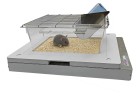Authors
Pedron et al. 1 Repeated transcranial direct current stimulation prevents abnormal behaviors associated with S.Pedron,J.Monnin,E.Haffen,D.Sechter, V.Van Waes 1, Julie Monnin (PhD)
Lab
EA 481 Laboratory of Integrative and Clinical Neuroscience,University of Franche-Comté,Besançon, France INSERM CIC-IT 808 Clinical Investigation Centre for Innovative Technology, University Hospital,Besançon, France
Journal
Neuropsychopharmacology
Abstract
Successful available treatments to quit smoking remain scarce. Recently, the potential of transcranial direct current stimulation (tDCS) as a tool to reduce craving for nicotine has gained interest. However, there is no documented animal model to assess the neurobiological mechanisms of tDCS on addiction-related behaviors. To address this topic, we have developed a model of repeated tDCS in mice and used it to validate its effectiveness in relieving nicotine addiction.Anodal repeated tDCS was applied over the frontal cortex of Swiss female mice. The stimulation electrode (anode) was fixed directly onto the cranium and the reference electrode was placed onto the ventral thorax. A 2 x 20 min/day stimulation paradigm for 5 consecutive days was used (0.2mA). In the first study, we screened for behaviors altered by the stimulation. Second, we tested whether tDCS could alleviate abnormal behaviors associated with abstinence from nicotine consumption. In naive animals, repeated tDCS had antidepressant-like properties 3 weeks after the last stimulation, improved working memory, and decreased conditioned place preference for nicotine without affecting locomotor activity and anxiety-related behavior. Importantly, abnormal behaviors associated with chronic nicotine exposure (i.e. depression-like behavior, increase in nicotine-induced place preference) were normalized by repeated tDCS. Our data show for the first time in an animal model that repeated tDCS is a promising, non-expensive clinical tool that could be used to reduce smoking craving and facilitate smoking cessation. Our animal model will be useful to investigate the mechanisms underlying the effects of tDCS on addiction and other psychiatric disorders.
BIOSEB Instruments Used:
Activmeter (BIO-ACTIV2-M)

 Pain - Thermal Allodynia / Hyperalgesia
Pain - Thermal Allodynia / Hyperalgesia Pain - Spontaneous Pain - Postural Deficit
Pain - Spontaneous Pain - Postural Deficit Pain - Mechanical Allodynia / Hyperalgesia
Pain - Mechanical Allodynia / Hyperalgesia Learning/Memory - Attention - Addiction
Learning/Memory - Attention - Addiction Physiology & Respiratory Research
Physiology & Respiratory Research
 Pain
Pain Central Nervous System (CNS)
Central Nervous System (CNS) Neurodegeneration
Neurodegeneration Sensory system
Sensory system Motor control
Motor control Mood Disorders
Mood Disorders Other disorders
Other disorders Muscular system
Muscular system Joints
Joints Metabolism
Metabolism Cross-disciplinary subjects
Cross-disciplinary subjects Preclinical studies and opioids: role in crisis management in the United States
Preclinical studies and opioids: role in crisis management in the United States 